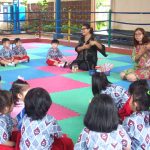
GANDHI SCHOOL ANCOL PRESCHOOL (TK)
Skills taught to a child at early stages form the foundation of other skills that will be taught to the child throughout life. However, in the absence of a proper foundation, the child would continue to struggle for grasping new skills and ideas at later stages. Thus, a preschool provides a child with the requisite skills, such as language recognition, proper speech, alphabets identification, basic mathematical skills, and much more. Once a child gets admitted to a school, it becomes easier for him to pick up things and get adjusted, as he already has his basics strong. A preschool increases a child’s learning experiences which are, at times, missed out at home and in society. It is during these crucial years that a child develops the attitude and aptitude, thereby allowing him to attain success in later years of his life. Preschool education builds confidence, enthusiasm, and eagerness to learn, which is essential in later school years. While interacting with other fellow mates, a child learns social skills, such as how to wait, how to take turns, and how to listen. Social skills are extremely significant for a developing personality, which can take a person to greater heights, if followed in the right direction .We at Gandhi school Ancol have a well -defined program for the toddlers which can be summed up as below:
TK GANDHI’S VISION AND MISSION
- To have basic knowledge of their faith
- To have good moral conduct
- To be able to communicate verbally and write fluently
- To have intellectual independence and social –emotional
- To mold character’s positive traits and good conduct
- To give knowledge and skill so that they can adapt in society
ACADEMIC DEVELOPMENT
PG CLASS (3-4 YEARS OLD)
FOCUS
- Mental Coordination
- Develop Essential Motor Skills
- Emotional and social development
- Cognitive Skills
- Fun activities to stretch children’s body and mind
TK A CLASS (4-5 YEARS OLD)
FOCUS
- Word building in English
- Pre-writing skills
- Pre-reading skills
- Math readiness
TK B CLASS (5YEARS OLD)
FOCUS
- Writing Skills in English and in Bahasa Indonesia
- Reading Skills in English and in Bahasa Indonesia
- Mathematics
- Science
- Mandarin
- Computer
- Extended Enrichment: Language and Mandarin
Teachers promote language and literacy by reading stories aloud, encouraging children to talk about their work, creating a classroom environment rich in different examples and uses of print (in English and children’s home languages), and helping children turn their ideas and artwork into books. They encourage children to talk with each other and engage them in meaningful conversations about topics of interest to the children.
A variety of art materials, such as markers, crayons, paints, and colored papers is readily accessible to the children and within their reach. Teachers invite children to express their feelings and ideas through these media.
SOCIAL DEVELOPMENT
The teacher actively fosters a sense of community within the group. For instance, photos of children’s families are prominently displayed; different aspects of the children’s homes, cultures, and home languages are part of the classroom; and children sometimes work on group projects (such as creating a mural). Every child feels like he or she belongs. Children learn that it’s important to respect others, despite differences, and to work together as a team.
The teacher observes and responds as needed to help children resolve social conflicts, such as fights over toys. He talks to the children about what has happened and helps them come up with a solution acceptable to all—thus helping children build problem solving skills they can use in the future. Most preschoolers want to be friends with their peers, but lack the verbal skills and ability to see the other child’s point of view. Teachers help them think through what happened and find the words they need to express their feelings and their suggestions for solving the problem.
Typically, 3-year-olds can follow simple directions and enjoy classroom tasks such as setting the table for lunch or watering the garden. Most 4- and 5-year-olds can pour juice and get their own snacks.
Four-year-olds begin to engage in real cooperative play (“I’ll be the baker,” one child says, “and you come to my store to buy cupcakes”). Five-year-olds expand their play, in cooperating complex props and scenarios. Teachers provide stimulating opportunities and materials. They also make sure that 3-year-olds, who like sitting next to each other and chatting while they use toys (associative play), have the space to do so.
LARGE MOTOR DEVELOPMENT
Three- and 4-year-olds need to move their bodies frequently, so teachers plan plenty of well-supervised physical activities throughout the day. These activities challenge children, but they also can be adapted to accommodate a wide range of abilities. For instance, a teacher might set up a low four-inch-wide balance beam for 3-year-olds, while older children have access to a three-inch beam. Inside the classroom, preschoolers dance to music, exercise (“jump in a circle” as the teacher suggests), and play games that promote coordination (“Simon says, ‘Stand on one foot and touch your nose’”).
SMALL MOTOR DEVELOPMENT
Since 3- and 4-year-olds in any given classroom vary in their small motor dexterity, teachers provide a wide range of materials for various levels of development. At this age, children practice and hone their fine-motor coordination by playing with pegboards, play dough, blocks, Duplo and Legos, and large beads. Teachers encourage children to dress themselves. But if a child becomes frustrated in zipping her coat, a teacher comes to her aid.3 and 4-year-olds can pour juice from small, manageable containers into their cups and wipe up any spills.
LANGUAGE DEVELOPMENT
Preschoolers improve their language skills by listening to and speaking with adults. Teachers talk to the children at center time and in small groups. They also make sure to have individual conversations with each child throughout the course of the day.
Preschoolers learn simple rhymes, songs, and finger plays Teachers promote language and literacy by reading stories aloud, encouraging children to talk about their work, creating a classroom environment rich in different examples and uses of print (in English and children’s home languages), and helping children turn their ideas and artwork into books. They encourage children to talk with each other and engage them in meaningful conversations about topics of interest to the children.








Recent Comments